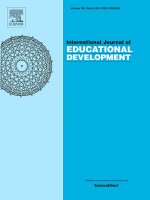Contemporary Social Science
View Journal Article / Working PaperLife expectancies at birth have increased at the global level from 47 years in the mid-twentieth century to around 71 years today, and are expected to rise to 78 years by the mid-twenty-first century and to 83 years by the end of the century. The proportion of the world’s population aged 65 years and over has increased from 5% in the mid-twentieth century to just over 8% in 2015, and by 2050, it is expected to reach almost 16%, equating to more than 1.5 billion people. The end of the century will see 23% and 2.5 billion of the world’s population aged 65 years and over. In newly ageing populations, fertility has often declined dramatically. This presents challenges to individuals, families and societies, not least because many of these societies rely on family-based support. The traditional family is shrinking and its role is changing. As we live longer, we are grandparents for longer and grandparenthood in the modern family is changing. This paper considers global demographic change and grandparenthood, and utilises data from Oxford’s Global Ageing Survey to understand changing family roles and attitudes to family, which impact on grandparenthood.




